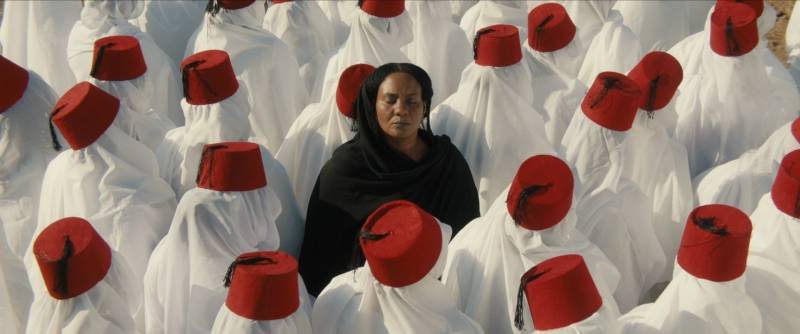The director, who was born in Dubai to Sudanese parents, moved back to Sudan when he was 6 and spent much of his childhood there. Alala’s mother worked in a Sudanese public library, and her bookworm son remembers devouring novels by Isabel Allende, Gabriel García Márquez and Naguib Mahfouz. Magical realism inspired this film, from a country where Arab and African worlds swirl together.
“The Arabic language, the African faces,” says Alala. “Islamic but very African roots and ceremonies. I just feel like it’s the land of untold stories, unseen faces.”
Telling those stories and showing those faces is partly why Film Movement decided to distribute You Will Die at Twenty in North America.
“It puts you in a very different place than Americans are used to being,” says Film Movement’s president, Michael Rosenberg. While he admits there are challenges to any small, subtitled arthouse film—from a developing country—with a depressing title, Rosenberg says it didn’t hurt that the movie has been picking up awards at film festivals around the world, including Best Debut at the Venice Film Festival, and enrapturing critics.
“We got a review in The New York Times and it was a critics’ pick,” Rosenberg notes. “And we got a critics’ pick review from Variety and we got a rave review from the Los Angeles Times.”
For now, You Will Die at Twenty can be watched through Film Movement’s website, which links through to the websites of numerous art house cinemas. In April, it’s scheduled to be on Amazon and Apple. The challenges of making it, says director Amjad Abu Alala ranged from arranging financing to filming in a country with virtually no infrastructure to a production schedule unfortunately timed to December 2018.
“That happened to be when the revolution was starting,” Alala says, calmly. “I had mixed feelings.”
Mixed because right when he started filming his dream passion project, the movement for democracy—which he ardently supports—created complications. The fighting never came close to his set, but Alala was unable to pick up four tons of equipment he’d shipped from Egypt for 10 of the 24 days he had budgeted to film. So he shot all of his exterior daytime scenes, the ones less dependent on technical lighting, first. “It was hit and run, hit and run,” he recalls, chuckling. “I could never know what would happen.”
He could not know the authoritarian Islamic government would get paranoid about his script, even though they’d approved it. To be fair, Alala had given them a fake version, leaving out the kissing and the alcohol.
“They started sending spies on the set,” he grins. “And we know them. We can see them. That one’s a spy, that one’s a spy and we actually found a way to deal with them by getting them involved in the film.”
He bursts out laughing. Some of the spies became extras, he says, and even helped cast other spies.
These days, Alala has much to feel good about. He just signed with the top Hollywood agency—CAA—that also represents Steven Spielberg and Tom Cruise. Not bad for a guy representing a country that was banned by the Trump administration until two weeks ago. For Alala, a revolution is just beginning.
“A revolution on closed minds,” he says. “A revolution for artists’ freedom. Freedom of art.”
The Academy announces its shortlist of 15 movies for Best International Feature on Tue., Feb. 9. Even if his film is not on it, director Amjad Abu Alala feels he’s won.
Nina Gregory edited this story.
Copyright 2021 NPR. To see more, visit NPR.9(MDAxOTAwOTE4MDEyMTkxMDAzNjczZDljZA004))

9(MDAxOTAwOTE4MDEyMTkxMDAzNjczZDljZA004))

